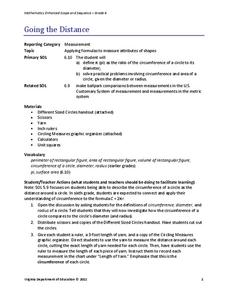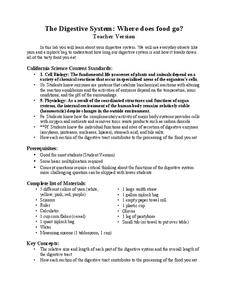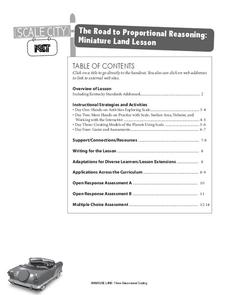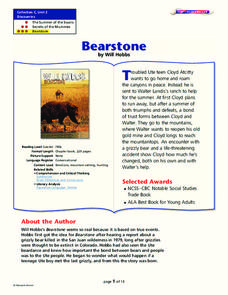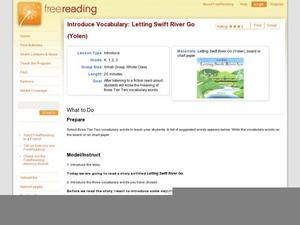Laboratory for Atmospheric and Space Physics
Where Are We Going?
Come take a ride on the space bus! Scholars go on an imaginary trip to pick up their peers from the inner and outer planets while reinforcing math skills. First, learners round decimals to identify each planets' distance from Earth....
Virginia Department of Education
Going the Distance
Estimate the value of one of the most famous irrational numbers. The hands-on lesson instructs classmates to measure the circumference and diameters of circles using yarn. The ratio of these quantities defines pi.
Illustrative Mathematics
Many Ways to Do Addition
A great aspect of teaching math is that children have the freedom to solve problems using a variety of different strategies. The focus of this lesson is for young mathematicians to become aware of many ways of answering addition...
LABScI
The Digestive System: Where Does Food Go?
Would you believe that your digestive system stretches to five times your height?! Help your pupils to understand this relationship as they work through the laboratory exercise. The first instructional activity of a 12-part series is a...
Kentucky Educational Television
The Road to Proportional Reasoning
Just how big would it really be? Young mathematicians determine if different toys are proportional and if their scale is accurate. They solve problems relating scale along with volume and surface area using manipulatives. The last day of...
Laboratory for Atmospheric and Space Physics
Looking to the Future
New Horizons set forth on a mission to Pluto in 2006. Ten years later, the spacecraft is still on its way. Here, enthusiastic scholars predict what they will be like—likes, dislikes, hobbies, etc.—when New Horizons arrives at its...
Virginia Department of Education
Go with the Flow
How does nature's hierarchy relate to our local human environment? Answer this question, along with others, as the class visually depicts the natural hierarchy provided by nature. Pupils discuss each piece of the pyramid and its energy...
Advocates for Human Rights
The Right to a Clean Environment in the United States
Even if a school has gone digital, chances are there's still plenty of paper being used. The three activities help scholars learn about the environmental impact of paper and another consumer products of their choosing, the issue of...
DiscoverE
A Clever Way to Water
Your plants will survive without you. Scholars create a device that can water plants using a coiled string. Along the way, they learn about adhesion and cohesion of water. The challenge is to keep the plants alive for at least a week.
NASA
Ascent: 50 Seconds to MECO
All systems go! With a video and a Google Earth tour as background, pairs investigate two graphs. The graphs display acceleration vs. time and velocity vs. time of a space shuttle launch. Using graphing calculators, the pairs take a...
Curated OER
A Potting We Will Go
Students read A Tree is Nice and It Could Still Be a Tree. In this tree planting lesson, students compare and contrast private property and common resources. Students identify the needs of a tree and follow the directions to plan a tree...
Curated OER
The Decision to Go to War
Young scholars examine President Bush's decision to go to war with Iraq. They work together to discuss a topic related to this given to them by their teacher. They answer questions to complete the lesson.
Curated OER
Going to Extremes: High Anxiety
Students examine the dangers of mountain climbing. After watching a video, they discuss the role of a German research team going into the Alps to predict who is going to adjust to the change in oxygen levels. They discover the...
Curated OER
Bridge to Terabithia: Visualizing to Optimize Comprehension
Good readers visualize. And in our image-rich culture it is imperative that children are provided with opportunities to practice this important skill. A selection from Shel Silverstein’s Where the Sidewalk Ends and Bridge to Terabithia,...
Curated OER
Bearstone
Use the story "Bearstone" by Will Hobbs to explore issues related to growing up. In this work, a troubled teen finds himself through an adventure in the wilderness. Learners practice summarizing, drawing inferences and conclusions, and...
National Wildlife Federation
Climate Solutions – A Call to Action!
The final lesson in the 21-part series on climate change focuses on energy solutions to the consumption problem. Using data specific to their school, pupils make recommendations, follow up on actions, and carefully track progress....
Curated OER
Introduce Vocabulary: Letting Swift River Go (Yolen)
If your class is reading Jane Yolen's Letting Swift River Go, explore these vocabulary words in context: faint, quench, remain, and sacred. Before reading the story aloud, acquaint learners with these words briefly. As you read,...
Curated OER
Introduce Vocabulary: Bringing the Rain to Kapiti Plain (Aardema)
The African plains come alive as scholars learn vocabulary in context through Verna Aardema's story Bringing the Rain to Kapiti Plain (tip: this strategy can be applied to any book). Precede reading by introducing the new words pupils...
Curated OER
Introduce Vocabulary: Alexander, Who Use to be Rich Last Sunday (Viorst)
Although this vocabulary-in-context activity is focused on Judith Viorst's book Alexander, Who Use to Be Rich Last Sunday, the strategy can be applied to any book budding learners read with you. First, introduce the three new words you...
Curated OER
Introduce Vocabulary: Froggy Goes to School (London)
Just like your budding readers may have felt, Froggy is nervous on his first day of school. Use Johnathan London's book Froggy Goes to School to practice vocabulary in context. Prior to reading the story aloud, pre-teach the new words...
Curated OER
Introduce Vocabulary: From Tadpole to Frog (Pfeffer)
Take an amphibious journey with budding readers as you explore vocabulary in Wendy Pfeffer's informative book From Tadpole to Frog. This text is the backdrop of a vocabulary exercise based on six words: fertilize, gills, hatch,...
Curated OER
Introduce Vocabulary: Franklin Goes to School (Bourgeois)
Join Franklin the turtle at school as youngsters learn new vocabulary in the context of Paulette Bourgeois' story (or apply this strategy to any book). Scholars are acquainted with new words before reading and raise hands when vocabulary...
Curated OER
Introduce Vocabulary: I Hate To Be Sick (Bermiss)
No one likes being sick; use Aamir Bermiss' book I Hate To Be Sick as the context for a vocabulary study of illness-related words. Acquaint pupils with this unhealthy vocabulary (dizzy, faint, fever, gag, and sore) before reading aloud,...
Curated OER
Introduce Vocabulary: Kindergarten Count to 100 (Rogers)
Combine counting and vocabulary in context using Jacqueline Rogers' Kindergarten Count to 100. Suggested words for this text are: first, fountain, salute, second, and third. By introducing the terms before reading the text, you're...
Other popular searches
- Going to and Will
- Going To/will
- Going to and Will Usage
- Use of Will or Going To
- Predictions Will/going To



